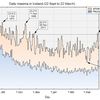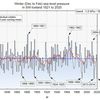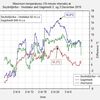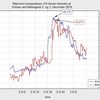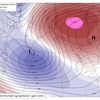Bloggfćrslur mánađarins, febrúar 2014
3.2.2014 | 18:10
A January without freezing temperatures
The absolute minimum temperature at Vattarnes in the Eastern Fjords area in Iceland remained above 0.0°C during the whole month of January 2014. This is the first time that this happens at an Icelandic weather station. The final minimum of the month was 0.4 °C (measured at 10 and 14 utc 14 January).
At the nearby island station at Seley (less than 10 km distant) the January minimum was 0.0°C. A few other stations in the country registered their highest January minima ever.
On the whole the temperature variability in Iceland during this month was unusually small. The absolute maximum temperature in the entire country was only 10.1°C, the lowest since 1994 and the lowest minimum in the inhabited areas was -16.4°C, the highest in the books since 1990. The total range (maximum - minimum) was thus only 26.5°C. It was the same in January 1990 but one has to go back to January 1947 to find a lower value. Then the station density was much lower than now and comparison is open to question.
There were very few observations in the highlands until about 1995. In most months the lowest temperature in the country is observed at the highland stations - this time -19,0°C at the Brúarjökull glacier. This is about 6°C higher than the average of the last 10 years.
The absolute temperature range in Reykjavík has only once been as small in January as now (in 1987) and it has by a large margin never been as small in Akureyri (since reliable maximum registrations began there in 1935).
Overall January was warm in Iceland. In the country as a whole it is about the 10th warmest of the period 1874 to 2014, but at some of the stations in the East - both coast and inland it was the second warmest of all time. This was the case at Teigarhorn which has continuous observations back to 1873, only January 1947 was warmer than now.
In Reykjavík it was the 12th warmest (starting in 1871) and 11th warmest in Akureyri (starting in 1882).
The Vattarnes automatic station is located on a low promontory at the mouth of Reyđarfjörđur, the largest fjord in Eastern Iceland:
Vattarnes 64°56.22'N; 13°41.086'W; 5.0 m.a.s.l. began in 2000
A synoptic station was in operation there during 1931 to 1943 (no minimum thermometer).
A web search for the name will return some photographs (mainly the lighthouse) and a map search should find the Vattarnes promontory.
Bloggar | Breytt s.d. kl. 21:14 | Slóđ | Facebook | Athugasemdir (0)
Um bloggiđ
Iceland Weather blog
Nýjustu fćrslur
- Unusually high temperatures
- Unusually high sea level pressure
- Sea level pressure: Unusually low in Iceland this winter
- A new national maximum temperature record for December
- A new sea level pressure record for June in Iceland
- An unusually warm April in Iceland
- A new October high pressure record in Iceland
- A new absolute September maximum temperature record in Iceland
Heimsóknir
Flettingar
- Í dag (5.10.): 1
- Sl. sólarhring: 3
- Sl. viku: 14
- Frá upphafi: 10831
Annađ
- Innlit í dag: 1
- Innlit sl. viku: 14
- Gestir í dag: 1
- IP-tölur í dag: 1
Uppfćrt á 3 mín. fresti.
Skýringar


 hoskibui
hoskibui
 svatli
svatli
